Christmas. No holiday has given us more cloying and irritating movies. Here are 12 movies to ruin the holidays.
Table of contents
Black Christmas (2006)

Sure, the director claims he’s humiliated by the final product and Bob Weinstein’s interference and it barely makes a lick of sense, but this is one of our guiltiest of guilty pleasures. Director Glen Morgan has said of the experience helming Black Christmas “It was humiliating, it was horrible. I stayed to try and protect the cast and crew, friends of mine, and ended up taking it on the chin.” In the book The Anatomy of Fear: Conversations with Cult Horror and Science-Fiction Filmmakers Morgan detailed some of the interference and general idiocy he had to deal with while prepping the movie, “I actually had someone tell me that all my notes and ideas were in the movie and were coming across the way I wanted, but in order to have that in there, the audience has to think. And the last thing they want is the audience to think. That’s when I knew I was fucked.“
As with his other remake Willard, Glen Morgan has a good eye for visuals, and for a slasher film, there’s barely a moment of downtime in Black Christmas. We trade in character development and any sort of narrative cohesion, for one eyeball being gouged out after the next. There were loads of reshoots and the final product feels like some of the film reels were presented out of order. Why Bob Weinstein felt he needed to micro-manage and interfere on a cheap $9 million slasher movie to dumb down already dumb material is beyond reason.
Black Christmas was dated for, you guessed it, Christmas — which was one of the endless disagreements between the studio and Morgan. Morgan wanted the movie to open a few days before Christmas, stating that auds won’t care about Christmas when the day is over. Whatever the release date, Black Christmas was probably always going to die a quick box office death from poor word of mouth. The domestic run pulled in just $16,273,581 and after theaters take their cut of the ticket price, P&A expenses would mostly be in the red and the budget untouched. The overseas run was a bust, bringing in $5.2 million and it was dumped straight to video in most major markets. Morgan has not directed another movie after Black Christmas.
A Christmas Carol (2009)
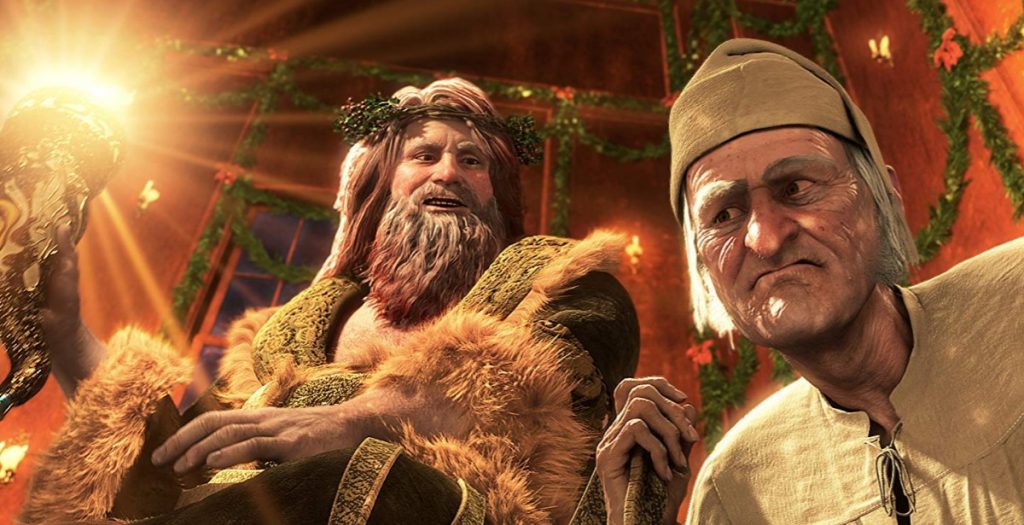
A Christmas Carol pulled in strong numbers worldwide but was another casualty of excessive spending where reaching a break-even point would be near impossible. Disney footed the bill for the $200 million film and launched one of the mouse house’s most expensive worldwide marketing campaigns. In addition to a bloated traditional P&A spend and tons of corporate promotional tie-ins, Disney launched a 16,000 mile, six-month train tour, with a five-car train that had exhibits of the film — this required tons of Disney staff and money to see through.
Mark Zoradi, the head of worldwide marketing at Disney who spearheaded the exorbitant ad campaign was fired after the opening weekend numbers disappointed. Read More
Deck The Halls (2006)
This rotten Christmas picture was directed by super hack John Whitesell, whose filmography should strike fear into the hearts of moviegoers (See Spot Run, Big Momma’s House 2, Big Mommas: Like Father, Like Son). This bereft of any comedy production was apparently a miserable experience for Matthew Broderick who would repeatedly complain “I’ve hit rock bottom.” Read More
Jack Frost (1998)
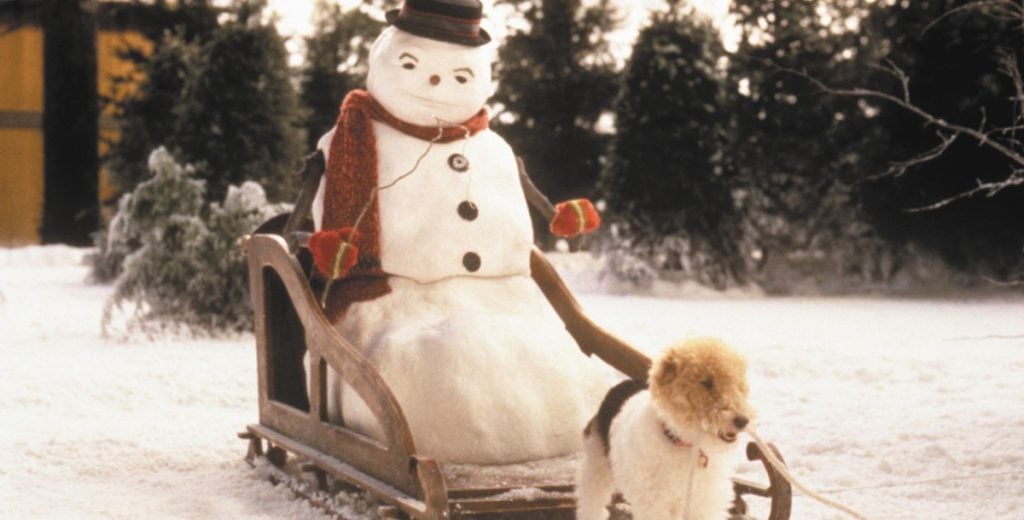
Michael Keaton’s career went down the shitter after starring in this horrifying family movie about a dead man reincarnated into a snowman, which Roger Ebert called “the most repulsive single creature in the history of special effects.” Sam Raimi was initially tapped to direct with George Clooney in talks to star, but both left the project. Raimi went off to helm the financially unsuccessful but acclaimed A Simple Plan and Clooney left this trainwreck and walked into another one with Batman & Robin. This Warner Bros production was budgeted at $40 million (not the ridiculously inflated box office mojo estimate at $85 million which has circulated) and went into development with a late 1998 holiday release planned. Jack Frost was dated for December 11 and bowed into a market saturated with family fare. Even if Jack Frost had the family marketplace to itself, dreadful reviews coupled with a nightmare-inducing lead character, would unlikely ever be a hit. It opened against Star Trek: Insurrection and would have competition from holdover family fare A Bug’s Life, The Rugrats Movie, and Babe: Pig in the City.
Pointless Trivia: Raimi’s A Simple Plan opened in limited release that weekend. Jack Frost tanked with $7,104,125. It did have modest weekly declines but closed its run with $34,562,556. Jack Frost sadly marked the end of studio movies built around the dimming star wattage of Michael Keaton — who was coming off a slew of flops Speechless (1994), Multiplicity (1996), and Desperate Measures earlier in 1998.
Mixed Nuts (1994)

In what is largely considered Steve Martin’s worst movie, Mixed Nuts was financed by Sony for an unreported amount. Do not go by the $15 million budget circulated by Wikipedia, as Steve Martin landed a $6.5 million payday for this trainwreck, and writer/director Nora Ephron was just coming off the smash Sleepless in Seattle and was also commanding large salaries. As the old adage goes, ‘dying is easy, comedy is hard’ Mixed Nuts is a movie overflowing with comedic talent, but this is the rare kind of misfire that just lays up there dead on the screen. Nothing about the wacky shenanigans of the people who work at a suicide crisis hotline during the Christmas holiday works. Nothing. Reviews don’t come much worse than those for Mixed Nuts and Sony dated this as their holiday release on December 23, 1994.
This was a particularly dreadful holiday season, as only Little Women racked up any goodwill with critics and audiences. Other openers were the moronic Street Fighter movie, Macaulay Culkin’s final child star role Richie Rich, the live-action The Jungle Book, I.Q., and Robert Altman’s dud Ready To Wear. Mixed Nuts opened with a disastrous $2,307,850 — placing #12 for the weekend led by Dumb & Dumber. Auds gave the picture a terrible C+ cinemascore and it quickly bombed out of release with just $6,821,850.
The Nutcracker (1993)
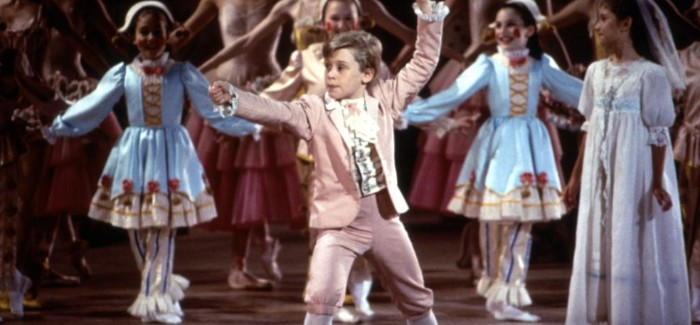
This version of The Nutcracker starred Macaulay Culkin as the Nutcracker Prince and it was during a drawn-out post-production spat that cemented his father/manager Kit Culkin as the ultimate stage parent from hell. Regency financed the picture for what was initially reported as $12 million, but the final budget came in at $10 million. Kit Culkin decided to take first gross points on the movie, instead of landing his son his $8 million asking price salary and little Macaulay appeared in the movie for $10,000. The production went without incident, but things got messy with Kit Culkin after children were confused with the narrative at a test screening and Regency decided to add a voiceover narration.
Kit made the demand that the narration be removed or Macaulay would not promote the movie and his image would be removed from all publicity marketing. The trailer had been attached to thousands of different film prints already in release and other means of marketing were in circulation with Macaulay Culkin and overhauling the whole publicity campaign would have been an expensive nightmare. Regency head Arnon Milchan eventually relented and the narration was dropped. Contracts were sent to Kit about his son’s publicity requirements, but he refused to sign them and made more demands. The demands began to grow and became more and more unreasonable — he wanted cast billing to be rearranged, he wanted the sound mix changed to his liking, some music bits redone, and even demanded that the ballet’s long dead costume designer be mentioned in all marketing. Arnon Milchan publically responded to Kit in the media, “I can take so much harassment, so much extortion, so much blackmail. Enough!” The narration was added back in and Macaulay was cut out of the marketing.
Warner Bros handled the distribution for The Nutcracker and dumped the movie into 786 theaters over the crowded Thanksgiving holiday frame. WB also opened their adult-skewing movie A Perfect World. The big opener was Mrs. Doubtfire and then smaller pictures were We’re Back! A Dinosaur’s Story and Josh and S.A.M. The Nutcracker was dead on arrival with $783,721 and quickly bombed out of theaters with $2,119,994.
The Nutcracker In 3D (2010)
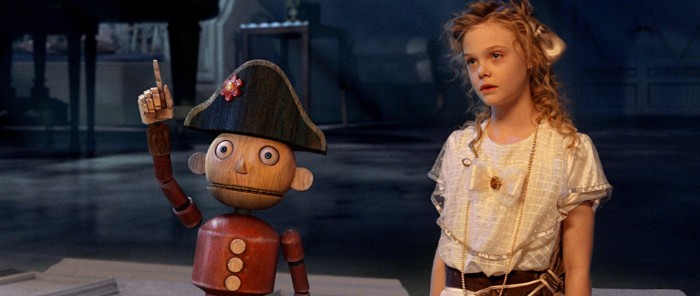
The Nutcracker In 3D was a huge $90 million production that was funded through equity financing from Russian state banks. The bankers lost over 90% of their backing on this fiasco. Read More
Reindeer Games (2000)
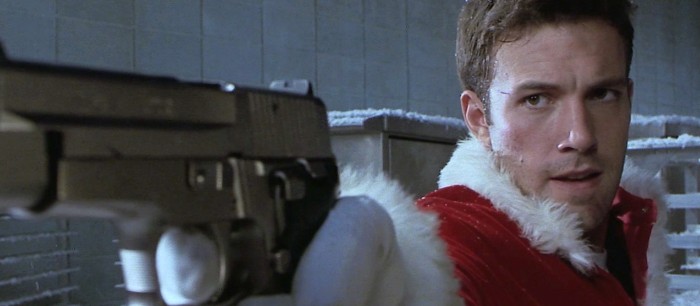
Charlize Theron said it best: “Reindeer Games. That was a bad, bad, bad movie.” This bad, bad, bad movie was sadly veteran director John Frankenheimer’s final picture before he died. Read More
Santa Claus: The Movie (1985)

Santa Claus: The Movie was put together by the father/son producers Alexander and Ilya Salkind, known for being the rights holders for the original Superman movies. Santa Claus: The Movie boasted a very large $50 million budget, most of which was financed from pre-sales to international distributors. Credit Lyonnais rounded out the production coin.
Ilya Salkind in all of his producing wisdom has said, “Adding on, “the Movie” was something I thought of very early in the conceptualization of the project. I felt we would sell the film as “The Movie”, yet in the film, the title is only “SANTA CLAUS”. It was the same with SUPERMAN. All the publicity was based on letting people know that it was a “Movie.” As opposed to what, Santa Claus: The Book? Ilya also took his signature producing move to his next project Christopher Columbus: The Movie — that title was actually registered with the MPAA before being changed to Christopher Columbus: The Discovery — and that picture was a critical and box office disaster.
After the production of Santa Claus: The Movie was completed, the Salkinds went to Cannes in full 1980’s excessive fashion and had 10 planes flown in formation throughout the weekend, with massive banners for Santa Claus: The Movie and also their producer credits. So humble.
TriStar handled domestic distribution, which had dealt with Santa just one year prior, but as an axe-wielding maniac in Silent Night, Deadly Night. Santa Claus: The Movie was heavily marketed and landed tons of corporate cross-promotional tie-ins — including McDonald’s, Kodak, and Coke. Santa was dated for November 27 as a big Thanksgiving holiday release. It bowed against Rocky IV and received mostly poor reviews. The opening was a soft $5,647,160 and the expensive picture sputtered out of release with $23,717,291.
Surviving Christmas (2004)
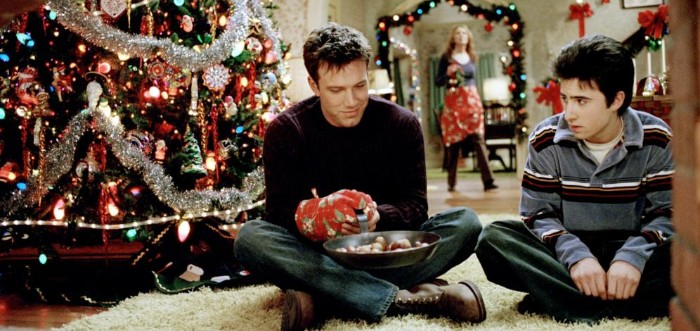
Here’s another grating Ben Affleck Christmas-themed disaster. While on a promotional tour for this awful movie, Affleck had some sort of breakdown, displaying bizarre behavior like putting his head in Christina Applegate’s lap, badmouthing frequent collaborator Kevin Smith, and refusing to talk about the movie. Affleck’s spokesman blamed his behavior on boredom and a sore throat. Yea, those sore throats are the worst. Read More
Trapped In Paradise (1994)
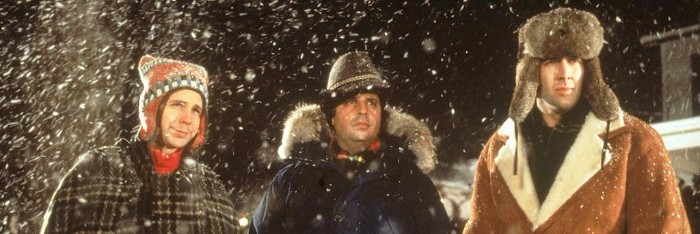
Jon Lovitz had some doozies to say about Trapped In Paradise: “Well, I feel like I’m very fortunate to be in movies at all, but I called it Trapped In Shit.” Lovitz also ripped the director George Gallo. “But the director would say, “Just do whatever you want.” He was bragging about what a great director he was before he hired us: “I’m as good as Rob Reiner and Martin Scorsese.” This is George Gallo. I said, “Don’t you think you should let other people say that?” We never even got to read the script. He’d go, “Well, let’s rehearse this.” I’d go, “Oh good, we get to rehearse.” And he’d start screaming at me, “Do whatever you want!” And I go, “Saying ‘do whatever you want’ is not direction.”
Apparently, Nicholas Cage and Dana Carvey took over directing numerous scenes because Gallo either did not or was not able to actually direct his actors and give technical direction to his crew. This miserable production received miserable reviews (It Stinks!) and was dumped by FOX into the slow post-Thanksgiving frame on December 2, where it was the only new wide release opening. Trapped In Paradise pulled in a terrible $2,744,653 in its first frame and auds gave the movie a toxic C+ cinemascore. It closed with a mere $6,017,509.
After filming wrapped, Dana Carvey and Jon Lovitz were attached to star in Bad Boys, which Lovitz said, “another George Gallo script—the script was awful.” That version of Bad Boys was very close to a reality, but did not materialize.
Turbulence (1997)
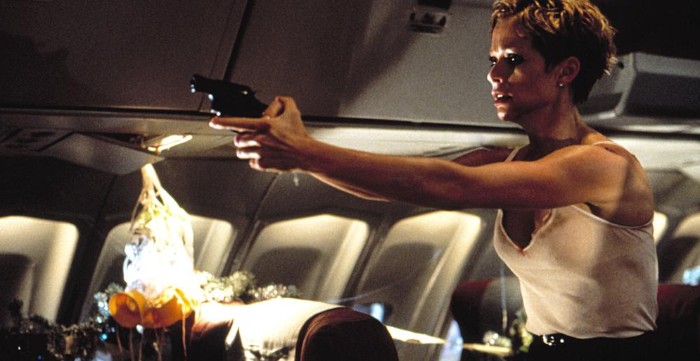
After half a century in television, Rysher Entertainment went big screen in the late 90s and Turbulence ended their theatrical division after its huge box office loss. Turbulence was produced by misguided ideas from Rysher, whose idea of a $60 million big-budget action film that will play to the international market was a movie that takes place mostly on one set, a screenplay written on used toilet paper, hiring a 70-year-old TV veteran to direct and cast the few roles in the film to non-bankable actors. This was a showcase for the utterly incompetent Lauren Holly — who also starred in Rysher’s other 1997 dud A Smile Like Yours. Holly gives a witless performance here and while her character is written to make one stupid and senseless decision after another, the role doesn’t require much from her for the first third of the film and she has the presence of an out-of-focus background extra. When the narrative eventually gives most of the screentime to her and she has to hold the weight of the picture on her shoulders, everything collapses into bad movie hilarity. Ray Liotta doesn’t appear to be directed at all and our hack director doesn’t modulate his performance, which ranges from over the top, to scenery-chewing, to prop chewing, all with an extra glaze of ham. Watching him terrorize Holly, with his eyes that are popping out of the sockets and his tongue sticking out of his mouth, makes for some good ‘what were they thinking’ entertainment.
MGM handled the release for Rysher and dated this stinker on January 10, 1997, against other genre fare The Relic and Jackie Chan’s First Strike. Reviews were abysmal and Turbulence was dead on arrival with $4,464,008. It very quickly left theaters with just $11,538,235.




